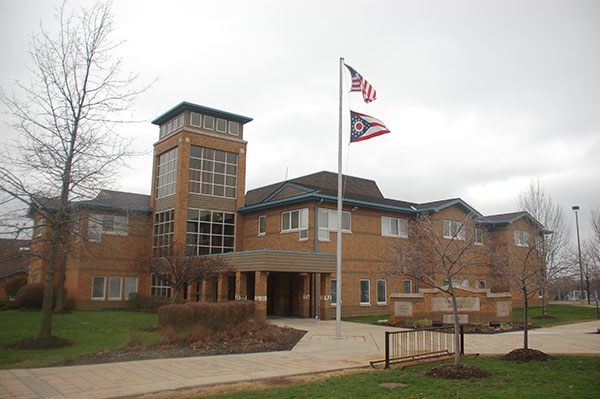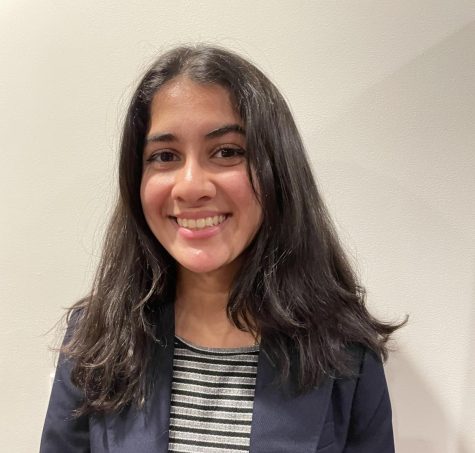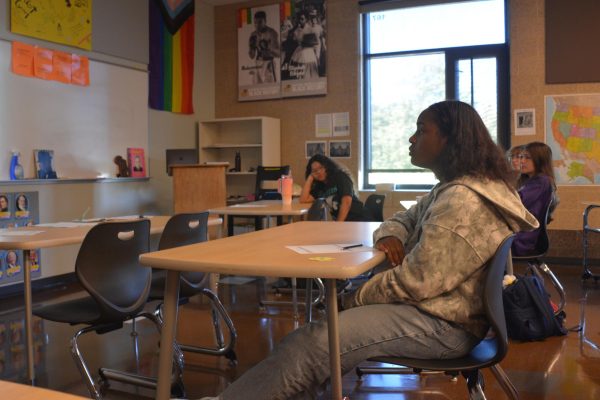How School Board Meetings Became Battlegrounds in 2021

After the preschool moves to Bryden, Hardis and Walsh see the Fairmount building as a space to be shared with the community.
School board meetings became contentious nationwide in 2021, with activists opposing mask and vaccine mandates and others upset about curriculum initiatives focused on race and racism.
In the Cleveland area, activists showed up at school board meetings in districts such as Chagrin Falls, Rocky River, Bay Village, Solon and Beachwood. Some of these school districts, including Beachwood, had come forward with anti-racism statements and action plans after the murder of George Floyd by Minneapolis police officer Derek Chauvin in May of 2020.
Jonathan Broadbent, co-chair of Protect Ohio Children, has attended school board meetings around Northeast Ohio. He was one of many speakers who came to a Beachwood Board of Education meeting on March 8, 2021 to express opposition to a mandatory online assembly that school district emails referred to as The Color of Trauma.
The Beachcomber reached out to Broadbent this fall to ask why he and others oppose initiatives such as the assembly, and he responded in a voicemail.
“It’s outside of the purview of a school board to broach moral and social character and to advocate for developing activists within the community,” he said. “It is certainly within the purview of the school district to formulate events around important civic matters such as race relations; however, it’s been my understanding that that dialogue has been severely one-sided.”
Solon parent Lisa Chiu has helped organize people in her community to support her school district’s initiatives supporting diversity, equity and inclusion (DEI). She spoke about the activists on the other side.
“They feel very passionately about their cause and their perspective, [and are] compelled to come to meetings, to share their perspectives,” she said. “I really don’t understand what it’s coming from… I hope that they want what’s best for students in their community.”
“When we talk about DEI, we want to see that the schools are doing the best they can for our children,” Chiu added. “We don’t see [these programs] as political. They keep talking about indoctrination, about trying to turn students into liberal activists, about teaching white kids to hate themselves. This doesn’t reflect the reality of what is happening in schools.”
The Trump administration led the backlash against this sort of training in Sept. 2020, when federal agencies were instructed to end diversity training that focused on white privilege and critical race theory.
Critical race theory is an academic concept that is more than 40 years old, but has only recently begun to get popular attention. The primary premise is that race is a social construct and that racism is built into our nation’s legal systems and policies. The main concepts of critical race theory, or CRT, originated from a framework for legal analysis created by legal scholars Derrick Bell, Kimberlé Crenshaw and Richard Delgado, among others, in the late 1970s and early 1980s.
After targeting diversity training in federal agencies, political conservatives directed their attention to the training provided in other institutions, including public schools.
Beachwood, a school district with a high percentage of minority students, was one of the first in the area to be targeted last spring, although other districts have seen much more contentious and persistent disruptions. The activists who showed up at Beachwood Board of Education meetings in March were responding to the district’s efforts to promote diversity, equity and inclusion while also addressing the stress and trauma students experienced during a pandemic year.
The district sent an email on March 3, 2021 informing families of a mandatory virtual assembly presented by Charde Hollins, who works for the Alcohol, Drug Addiction and Mental Health Services (ADAMHS) Board of Cuyahoga County, and Brittany Works, who is an Anti-Racism Consultant and Executive Director at Matters of Our Mind, LLC.
School Board Member Megan Walsh, who had attended a similar training for Beachwood staff, spoke in support of the assembly at the March 8 meeting.
“Being trauma-informed encourages anyone who interacts with people to consider the question ‘what happened to you’ instead of ‘what’s wrong with you?’” she said. “The purpose of doing that is to pull us out of a place of judgment and put us into a place of learning and understanding; so that approach can certainly be beneficial in the classroom, especially now, as we all cope with the trauma of a year-long pandemic.”
“I also appreciated the way that Mrs. Hollins covered historical trauma and the groups of people that are affected by it. Having this understanding of trauma is so important as our staff employs the strategies presented to counteract it, which were: value relationships, tell the story, and do the work.”
However, when the public comment period arrived, one online commenter and seven in-person speakers expressed opposition to the assembly. These opponents characterized the assembly as critical race theory, as divisive, as indoctrination and they also opposed the fact that it was mandatory. Several of the speakers claimed they had heard from staff members and parents who were opposed to the assembly but were afraid to speak to administrators about their disagreement.
The first speaker was Dr. Betsie Saltzberg, who identified herself at the meeting as a child advocate, child psychologist and political conservative. Saltzberg is a resident of Pepper Pike, yet she claimed to be appearing at the Beachwood Board of Education meeting on behalf of Beachwood residents.
“[I received] a deluge of emails from parents of [students] right here in Beachwood,” she said.
Like several other speakers at the meeting, part of what upset Saltzberg was that the assembly was billed as mandatory.
“When I saw the mandatory Color of Trauma presentation email I was beyond distressed, disturbed and disgusted,” she said. “…I’d like to know what makes the members or anyone else here think that they can legislate values and morality that started in the home, that comes from the home and from parents.”
“Did any of you ask the parents if they’d wanted this presentation for their children?” she asked board members and administrators at the meeting. “The parents that came to me said they were never asked. They fear retribution if they should come to this forum.”
“This is going to spread to other school districts,” Saltzberg added. “I want to know what makes you think it’s your job to raise other parents’ children—their values, their morals. This is not part of an academic curriculum—this belongs in the home.”
The second in-person commenter was Sherry Taylor, an African American woman who identified herself as a Beachwood resident for over 20 years.
“It appears that the superintendent and you, the school board members, grew up so white that you don’t even know the damage your decisions have caused previous, current and future generations of Beachwood students whose parents just wanted them to qualify to attend great universities,” she said. “Instead, you convinced yourself that blacks are oppressed and that it is your job to stop the oppression… Have you now looked at the results to realize what you did was immoral and had the opposite effect?”
Taylor criticized the board members and administrators for attempting to fix something that was not broken.
“It was never your job, you got out of your lane,” she said. “Your job was to provide students with the environment to be well-rounded and educationally successful.”
Taylor also made inflammatory comments suggesting that school districts in the area support teaching sexually inappropriate content to young children.
The third speaker was Jonathan Broadbent, who had also spoken earlier in the meeting in opposition to a policy change that he believed would blur the line between teacher opinion and academic fact. Now he spoke in opposition to the assembly, which he characterized as critical race theory, which in his view would create new prejudice and division among students based on race.
Another speaker that night was Tiffanie Broadbent, who ran unsuccessfully for school board in 2019. She emphasized her opposition to critical race theory, which in her view, encourages young people to become activists, and if they do not become activists, she said they are considered the enemy. She also felt that parents should be able to review the presentation in advance and should have the option to opt out.
Another speaker was Valerie Charms Mason, who attended the “Stop the Steal” event in Washington on Jan 6, 2021 but left when the rally turned violent and would later run unsuccessfully for a seat on the Beachwood Board of Education in Nov. 2021.
Charms Mason said she felt the district is singling people out based on race and that her children, who attend Beachwood schools, were being made to feel guilty for being white. She also expressed a sense of sadness that the community has become more politically divided in recent years.
“We have started standing on little pedestals telling everyone else who they are and what they are supposed to be doing,” she said. “We have stopped talking to each other and we have stopped being concerned about celebrating each person’s individuality,” she added.
The criticisms at the March 8 meeting were something of a surprise, since Beachwood has been discussing these issues for years without this sort of reaction.
The district implemented the Many Cultures One Bison initiative during the 2017-18 school year and promoted Kevin Houchins to the position of Director of Equity and Community Engagement in the 2019-20 school year.
For many years, Beachwood has also offered classes that promote inclusion and celebrate diversity: the human rights and conflict course has been offered for decades as has the Asian Studies course taught at Shaker High School, which is open to Beachwood Students; the African American Literature course has been offered since 2013-14 school year; and the African American history course has also been offered for several years.
The reaction this time may have been about timing.
This controversy in Beachwood was an early chapter in the firestorm that erupted nationwide last spring over teaching about race and racism in public schools. In the months that followed, conservatives introduced legislation in 29 state legislatures to limit teaching critical race theory or to otherwise restrict teaching issues related to race and gender, according to Education Week. 13 states have enacted bans, either by passing bills or through other means.
Ohio has not passed a similar ban, but two bills are being considered in the legislature.
Ohio House Bill 322 was introduced by Republican Don Jones on May 25, 2021 and was referred to committee on June 10. It would restrict public schools from discussing current events or controversial issues and would restrict activities involving political advocacy.
The Ohio legislature is also considering House Bill 327, introduced May 25 and referred to committee on June 10, which would ban Ohio schools from teaching “divisive concepts.” The bill was revamped this fall in response to testimony in order to clarify aspects of the bill and to include both protections and accountability for teachers. Both bills are opposed by the Ohio Council of Social Studies, which published a white paper stating their opposition to the legislation.
“These bills are contrary to the purpose of a social studies education,” the paper states. “Passage of these bills would—whether out of real or perceived threat—stifle classroom discussions, impair critical thinking, dampen creativity, and impose restrictions on the very freedoms needed to obtain civic competency.”
In addition to state legislatures, these cultural conflicts have been playing out in school board meetings. Meetings have become contentious and threatening, and school board members have even been threatened with violence.
These threats occurred here in Beachwood as well, as Superintendent Dr. Bob Hardis explained in a message to Beachcomber staff.
“In the wake of the March 8 board meeting, Beachwood Schools’ administrators and school board members received numerous threats and threatening messages from anonymous sources from across the country after Jonathan Broadbent and the Ohio Value Voters organization disseminated the footage from the meeting on various media platforms,” he wrote. “These threats were reported to the Beachwood Police Department through Officer Piro and my understanding is that they also kept the FBI informed.”
The National School Boards Association (NSBA) sent a letter to President Biden in October requesting federal help in monitoring threats, and described potential acts of “domestic terrorism.” The letter prompted the Ohio School Boards Association to cut ties with the national organization.
According to reporting by Cleveland.com, an unprecedented amount of campaign cash flowed into 2021 school board races, including dark money from undisclosed donors. Beachwood’s race was featured in the reporting. Advocacy organizations, such as Ohio Value Voters on the right and Protect Ohio’s Future on the left, donated to local school board candidates, and it is unclear where these organizations get their funding.
Jonathan Broadbent, the then-Beachwood resident (he has since moved to Newberry Township) co-chairs an organization called Protect Ohio Children, which is affiliated with Ohio Value Voters and is linked from their website. Protect Ohio Children encourages citizens to anonymously submit examples of “obscene, radical or dangerous information” from area school districts which they feature on their “indoctrination map.”
The indoctrination map labels Beachwood as a district with confirmed evidence of critical race theory, comprehensive sex education or social emotional learning, with a link to the March 8 school board meeting and a description of the March 11 assembly as “critical race training.”
Protect Ohio Children also has directions on their website for implementing a “tsunami strategy” at school board meetings.
“It is the coordination of multiple, well-written, effective statements that build on each other (a minimum of 30 statements if possible), presented by individuals at school board meetings or legislative hearings,” the website explains.
However, the coordinated opposition did not impact Beachwood’s plans last spring, as Hardis explained.
“…Our decision-making about trauma training for staff and students across the district was NOT influenced by the mischaracterizations presented by some at the March 8 board meeting,” Hardis wrote.
Students logged in to watch the March 11 presentation titled Unstoppable. The presenter Charde Hollins defined equality and equity and explored the difference between these terms. Students learned how to take action and apply knowledge and understanding to consider their roles as activists in their school, home and community. They identified how activism and change are important to communities, discussed a variety of characteristics and what actions make someone a leader.
The assembly also addressed how students can become better allies to vulnerable classmates.
“[The goal is for students] to incorporate concepts learned into everyday routines to continuously create safe spaces for racial equality and inclusion, how they can advocate for themselves and others when injustice occurs, and to recognize, respond and prevent bias,” BHS Principal Paul Chase wrote in an email to families.
According to a separate email sent to families soon after the virtual assembly, the goal was to make all students feel comfortable and heard.
“Students learned and developed the vocabulary for discussing race, skin color, beauty and history,” the email stated.
Student Council members were surprised that activists had shown up to oppose the online assembly when other district programs promoting diversity, equity and inclusion have not provoked such backlash. From the point of view of student council members, many previous district initiatives aimed to accomplish the same thing: to promote diversity, equity and inclusion of all students within the district.
Members of the BHS Student Council Exec Board attended the March 22, 2021 Beachwood Board of Education meeting that followed the Unstoppable presentation. Last year’s Exec Board President Elizabeth Metz, Vice President Emily Fan, Vice President Gregory Perryman and this reporter, who was Exec Board Treasurer. These students were elected by their peers to reflect student voices to the Board of Education.
The March 22 board meeting was well attended, and a large number of community members offered public comments. Of 23 comments that were made online or in-person, 17 were in support of the district’s diversity, equity and inclusion efforts, including the assembly. The majority of those who were critical were the same people who spoke at the March 8 meeting.
One parent expressed concern that her daughter, who has Down Syndrome, was forced to watch something that she could not understand. She wanted to know how much the speakers were paid and suggested that it was wasteful.
Senior David Kuang spoke in his capacity as last year’s Student Council Executive Board Secretary.
“It’s not always the best when your students go to school and learn these ideologies that are different from your own, but it’s important that they learn to grow up in this real world where there are systemic barriers,” he said. “We can’t say everyone’s equal or everyone has an equal chance of being successful… school prepares for the real world.”
“It’s important to be telling children that there is structural racism in the system and the country and people want to take it down,” he added.
Kuang’s statement was supported by the four other Student Council Executive Board members who attended the meeting.
Another local school district that saw considerable conflict over DEI training recently was Solon. At school board meetings in June, residents spoke out on both sides of the issue. As in Beachwood, many supported the training, while others were skeptical and felt that parents should be able to review the training materials in advance.
Lisa Chiu is a Solon parent who attended those school board meetings and organized other parents in support of the district’s diversity, equity and inclusion initiatives. She saw activists coming to board meetings who opposed diversity initiatives, and felt it was important that district leaders hear from DEI supporters as well.
“I think many Solon parents like me organized and felt like we really needed to take a stand,” she said. “We wanted the school board to hear our voices.”
Chiu was one of many pro-DEI voices who showed up at Solon Board of Education meetings.
“PTA leaders and former leaders all showed up, and these individuals are extremely invested in the school community,” she said
“What we are doing with DEI is not critical race theory,” Chiu said.
Lisa Chiu explained her perspective on the anti-DEI activists.
“At school board meetings, emotional people keep reducing diversity, equity, and inclusion to critical race theory,” she added. “At elementary school levels, [what we are talking about is] much more about identity and the celebration of cultures.”
In an email to the Beachcomber in Nov. 2021, Beachwood’s Director of Equity and Community Engagement Kevin Houchins explained why he feels it is important for Beachwood to offer DEI training.
“As we look around Beachwood Schools, diversity is who we are,” he wrote. “We proudly boast that our district hosts students from all over the world.”
“This [diversity] provides our students with the opportunity to explore the world through interactions with their peers and increasingly diversified staff, thus providing a learning environment that is both equitable and inclusive,” he added. “Therefore, DEI work is not an option; it is a necessity.”
Houchins explained that learning about diversity is essential to students’ ability to respect themselves and to navigate the larger world.
“Our families come from all over the world,” he wrote. “It is essential that we create a learning environment where we embrace differences while maintaining individual cultural pride.”
“As technology has evolved, providing us with an almost instantaneous ability to connect with others worldwide, interacting with differences is an essential skill that students should have,” he added. “Our students should leave Beachwood Schools with the adeptness to navigate differences and work well with others.”
Lisa Chiu explained what she and other DEI supporters hope to achieve in Solon.
“What do we aim to do in schools?” she asked. “We are preparing students in academic subjects, but also in how to be leaders and to go on to many professions, equipped with tools and backgrounds to be successful.”
“DEI issues are relevant in Corporate America as profitable companies believe in diverse leadership, creating pipelines within their company towards inclusion, and the makeup of their company is representative of many individuals,” she added. “Understanding different people and respecting other perspectives, preparing students for working with each other is vital.”
Senior Gregory Perryman put the local conflict into the national context.
“[People are very polarized by] characteristics of our political climate right now,” he said. “There is a lot of misinformation and disinformation and lies, and we’ve seen that trickle down to the lowest level.”
“So what is most troubling… is seeing this come to life even in [Beachwood],” he added. “It is a symptom of a larger problem that we have forgotten how to work together and solve problems, how to work from a common set of facts, and how to be honest and move forward.”

Vidula Jambunath began writing for the Beachcomber in the fall of 2021. She is interested in covering news inside and out of Beachwood High School. In...
Evelyn Zhang started writing for the Beachcomber in fall of 2020. She is interested in covering news. When not writing for the Beachcomber, Evelyn likes...




![“My parents have always said that education is important. My parents are Chinese immigrants, I'm Chinese American, [and that's a] value that has always been ingrained in our community,” said Senior Lyndia Zheng, pictured with Tony Zheng](https://bcomber.org/wp-content/uploads/2025/10/DSC_4244-600x400.jpg)





